
The West Australian Football League is an Australian rules football league based in Perth, in Western Australia. The league currently consists of ten teams, which play each other in a 20-round season usually lasting from April to September, with the top five teams playing off in a finals series, culminating in a Grand Final. The league also runs reserves, colts (under-19) and women's competitions.

A gentlemen's club is a private social club of a type originally established by old boy networks, typically from Britain's upper classes from the 17th century onwards.

The Melbourne Cricket Club (MCC) is a sports club based in Melbourne, Australia. It was founded in 1838 and is one of the oldest sports clubs in Australia.

The Royal Australasian Ornithologists Union (RAOU), now part of BirdLife Australia, was Australia's largest non-government, non-profit, bird conservation organisation. It was founded in 1901 to promote the study and conservation of the native bird species of Australia and adjacent regions, making it Australia's oldest national birding association. In 1996, the organisation adopted the trading name of Birds Australia for most public purposes, while retaining its original name for legal purposes and as the publisher of its journal, the Emu. In 2012, the RAOU merged with Bird Observation & Conservation Australia to form BirdLife Australia.
The Hong Kong Club is a gentlemen's club in Hong Kong, the first in the city. Opened on 26 May 1846, it is a private business and dining club in the heart of Central, Hong Kong. Its members were among the most influential people in the city, including such personalities as senior government officials, senior local businessmen, the heads of the major trading firms, and many legal and accounting professionals. It was often referred to simply as "The Club". The club's first premises were situated on Queen's Road at the junction with D'Aguilar Street.
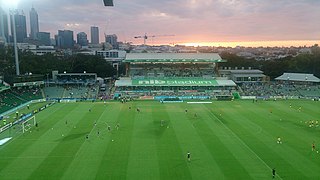
In Western Australia (WA), soccer is the most participated code of football, though it is a distant second in overall interest behind Australian rules football in Western Australia. It is governed by Football West. Football West runs the National Premier Leagues Western Australia, State Leagues, Sunday League and Metropolitan League. There are also numerous casual and school competitions, as well as futsal and indoor soccer in competitive and social games.
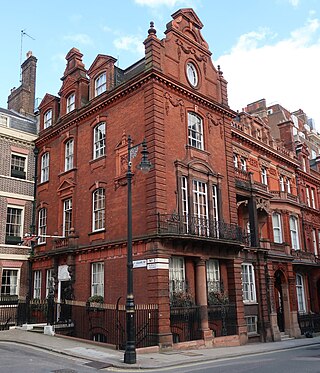
The University Women's Club, originally the University Club for Ladies, is a British private members club founded in 1886. As the popular gentlemen's clubs did not accept any women as members, its creation was intended to provide an equivalent club accessible to women. By its own definition, it is a club for "graduate and professional women of varied backgrounds and interests". Members include lawyers, scientists, writers and musicians, as well as businesswomen.
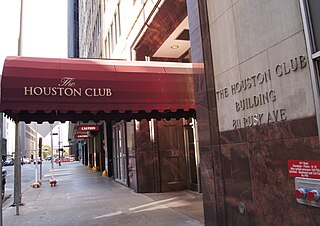
A social club or social organization may be a group of people or the place where they meet, generally formed around a common interest, occupation or activity with in an organizational association known as a club. Examples include book discussion clubs, chess clubs, country clubs, final clubs, fishing clubs, gaming clubs, women's clubs, gentlemen's clubs, hunting clubs, military officers' clubs, political clubs, religious clubs, traditional fraternal organizations, service clubs, fraternities and sororities, business networking clubs, science clubs, hobbyist clubs, informal professional associations, and university clubs. The term can also refer to a criminal headquarters, such as the Ravenite Social Club or the Cage.
Adrian Williams Barich is a sports presenter for television and radio, and a former Australian rules footballer for the West Coast Eagles and Perth Demons, and rugby league player.
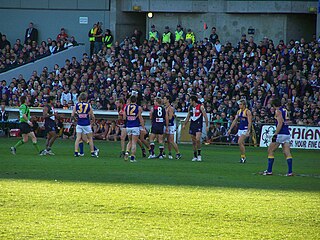
In Western Australia (WA), Australian rules football is the most popular sport. There are 29 regional club competitions, the highest profile of which is the semi-professional West Australian Football League. It is governed by the West Australian Football Commission (WAFC). It has 108,154 adult players and 46,187 children, the highest participation rate per capita (8.5%) in Australia, second most players of any jurisdiction, accounts for around a fifth of all players nationally and is growing faster than any other state. It is the third most participated team sport after soccer and basketball.
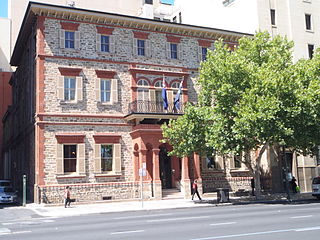
The Adelaide Club is an exclusive gentlemen's club situated on North Terrace in the South Australian capital city of Adelaide. Founded in 1863, the club comprises members of the Adelaide Establishment.
The Australian Association of Lyceum Clubs, formed in 1972 from several smaller clubs, is an Australian arts, literature and social activism group for women only. The aim of the AALC is to promote a spirit of goodwill and understanding within the Association and to enhance the enjoyment of Lyceum by providing opportunities for contact and friendship with members of other Lyceum Clubs. The first Lyceum Club was founded in London, England in 1904 by Constance Smedley.
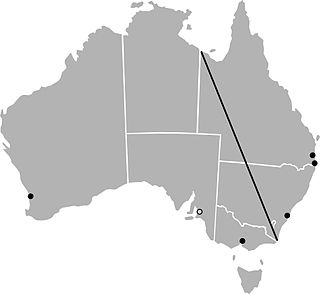
The Barassi Line is an imaginary line in Australia which approximately divides areas where Australian rules football or rugby league is the most popular football code. The term was first used by historian Ian Turner in his 1978 Ron Barassi Memorial Lecture. Crowd figures, media coverage, and participation rates are heavily skewed in favour of the dominant code on either side. Most other sports are unaffected by the dichotomy; Australian cricket, for example, has maintained consistent national interest throughout its history, though soccer faces more competition for participation in areas where Australian rules is more popular.
The Royal Automobile Association of South Australia (RAA) is an Australian motor club that provides a range of member services. These services include 24-hour emergency breakdown assistance, vehicle inspection services, insurance services, and a range of additional member benefits.
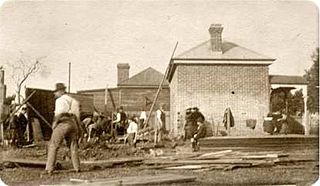
The Ugly Men's Voluntary Worker's Association of Western Australia Inc., generally shortened to the Ugly Men's Association or Ugly Men was a uniquely Western Australian fund-raising and charitable organisation established in 1917. Previously, a Mrs Alicia Pell had organised an "Uglie Man" competition to raise funds for the Red Cross in Kalgoorlie. The East Perth Football Club then built on the concept to raise funds for the Perth Children's Hospital and the War Patriotic Fund. The football club's work developed into a successful grassroots organisation with the first branch opening in the Perth suburb of Mount Lawley and focusing on supporting cases of hardship caused by war.

The Public Schools Club is a former London gentlemen's club.

The Swan River Mechanics' Institute was the Swan River Colony's first cultural centre, established on 21 January 1851. In time it was to house an extensive and well-used subscription library and a natural history collection, including botanical, zoological and mineral specimens. A new building replaced the old in 1899, and in 1909 the institute was renamed Perth Literary Institute.
The Geelong Club is a private social club originally established in 1859 originally as the Western Club, since most of its members were from outside Geelong in the Western District. After a period of inactivity the club reformed in 1874, and then again in 1881, when a group of gentlemen committed to an ongoing organisation. The present organisation dates is foundation from this year. The club is a symbol of Australia's British heritage and Western District pastoralists.
The National Premier Leagues WA Women, also known as the NPL WA Women, is a soccer competition in Western Australia. The competition is conducted by Football West, the organising body in Western Australia. The league is a subdivision of the second tier National Premier Leagues Women's structure, which sits below the national A-League Women, it is the highest tier of local women's competition in Western Australia. The league was founded in 2020 in Western Australia, several years behind equivalent leagues in other states.












